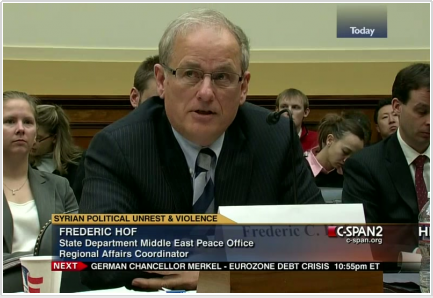Frederic Hof (pictured), a former State Department official, has offered a full and frank revelation: Iranian and US “non-Government” representatives are holding secret “Track Two” talks on Syria.
Hof’s article for the Atlantic Council, where he is a Senior Fellow, explains how Iran told the Americans of its fundamental interest — Iranian and regional security — in maintaining the Assad regime.
When an American delegate pondered that Washington and Tehran “might be on a collision course in Syria” as the Obama Administration pondered military aid to “moderate” insurgents, “the Iranian side reacted negatively”: it warned “that US escalation would be met with Iranian escalation”.
The Iranian response does not deter Hof, a long-time supporter of no-fly zones and political and military backing of Syria’s opposition: “Until Tehran sees the possibility of its client going down, its prevailing view may be that a reliable murderer in hand is worth far more than a respectable alternative in the bush.”
But there is a bigger question beyond the views of Hof and the other American participants.
Hof has leaked sensitive Track Two talks, normally a diplomatic taboo. Given that he has always acted with discretion, inside and outside Government, who in the Obama Administration endorsed the exposure of the discussions — and the response to Iran’s declaration of unbending support for the Assad regime?
Could the answer lie in the possibility in Hof’s article that, while Iran will not tolerate an opposition victory, it might be prepared to accept an Assad regime without Assad?
Syria: Can the United States and Iran Reach an Understanding?
Frederic Hof
Two days of very frank and worthwhile “track two” discussions between senior Iranian and US non-officials recently took place in Europe. Syria was, as it had been in the previous December round of talks, a major topic of discussion. Although there was no unanimity of views about Syria from either side of the table, a clearer picture emerged (in the opinion of this participant) of the conditions that would have to prevail for the United States and Iran to be in a position to consider cooperating on Syria.
Tehran’s fundamental reason for supporting the Assad regime was forcefully restated by the Iranian side: Lebanon’s Hezbollah is Iran’s “deterrent force” and first line of defense vis-a-vis Israel. Members of the Iranian team stressed that the “Assad regime”—not necessarily Bashar al-Assad personally—was essential (along with a supply corridor through Iraq to Syria) to maintain Hezbollah’s combat readiness. Although it may be assumed that Iran would wish to exercise considerable influence in Syria even in the absence of Israeli-Iranian tensions, the Iranians present at this discussion stressed the vital connection between regime preservation and the defense of Iran: alone among Syrian players, the Assad regime will do as Iran wishes with regard to supporting Hezbollah.
The distinction drawn by Iranian interlocutors between Bashar al-Assad and his regime was interesting, if not dispositive. The Iranian side acknowledged that, for many years, Bashar al-Assad and his regime had facilitated the passage through Syria to Iraq of jihadist elements responsible for multiple massacres of Iraqi Shia; elements that made a U-turn back into Syria and now threaten the inhabitants of both countries. The Iranian side went out of its way to emphasize that Tehran’s current relationship with Assad is based on neither affection nor respect. This is business. This is about a regime willing to subordinate itself to Iran on the issue of Hezbollah.
Although members of the Iranian team drew the distinction between man and regime, it struck at least one American that it was a distinction without a difference: that even if Bashar and his family could be induced to leave, the murderous performance of the regime to date has rendered it ineligible for any sustained role in Syria’s transition. How, after all, could a party fully steeped in mass homicide play a role in the consensual stabilization of the country?
One member of the US team posited that Iran and the United States might be on a collision course in Syria: that the Obama administration may be considering doing things consistent with its long-held position that the calculation of the Assad regime would have to be changed in order for that regime to take seriously a negotiated political transition. Based on President Obama’s West Point speech it appeared that the administration, with the full cooperation of Gulf partners and others, was thinking seriously about a major arm-train-equip program for Syrian nationalist opposition forces.
The Iranian side reacted negatively to this possibility. One team member wondered what possible US interest would be served by such an initiative: Syria was, after all, thoroughly contained with no spillover effects on neighboring countries. The American side reacted with incredulity to this observation. Another member of the Iranian delegation warned that US escalation would be met with Iranian escalation: a view, as one American noted, fully consistent with the properties of a collision. Another noted that Tehran was counting on President Obama to avoid any involvement in Middle Eastern armed conflicts.
All of the Iranians expressed the view that Iran and the United States ought to be able to reach an accommodation on Syria, the bases of which would be the preservation of the Syrian state and opposition to the presence of Sunni Islamists extremists. The Iranians took the view that Saudi Arabia was fully supportive of the worst of the worst and would have to be brought into line by the United States. The American side pointed out that Washington and Riyadh seemed now to be on or near the same page with respect to Syria: that military aid was being funneled to Syrians willing to fight both regime and jihadists.

